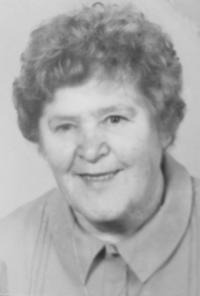To have a good mind, be healthy, and to believe in something that’s worth it

Download image
Marie Horáková was born on 14 December 1932. She comes from Mramotice. Soon after her birth her family moved to Znojmo-Přímetice. Marie attended a German school during World War II. Even as a pupil, she deliberately avoided situations in which she would be required to use the German salutation of Heil Hitler. In the 1950s the Communist regime organised a show trial with her father and sentenced him to seven years of prison. Marie’s father endured torture in the Cejl Street prison in Brno. He was later sent to the uranium mines in Jáchymov with the Auxiliary Engineering Corps (forced labour units instead of military service). He contracted cancer while serving his sentence and was released by a presidential amnesty. He died soon after he returned home. Thanks to Marie’s six-year-younger brother, her family made the acquaintance of numerous important figures of the Czechoslovak dissent. Marie Horáková lives in Znojmo District.
